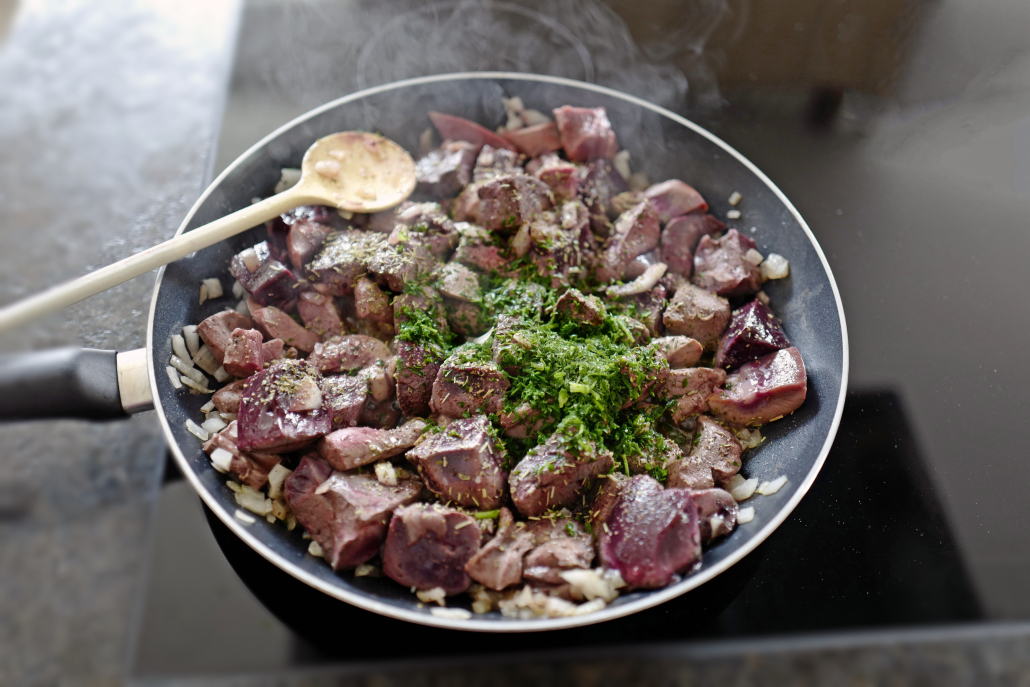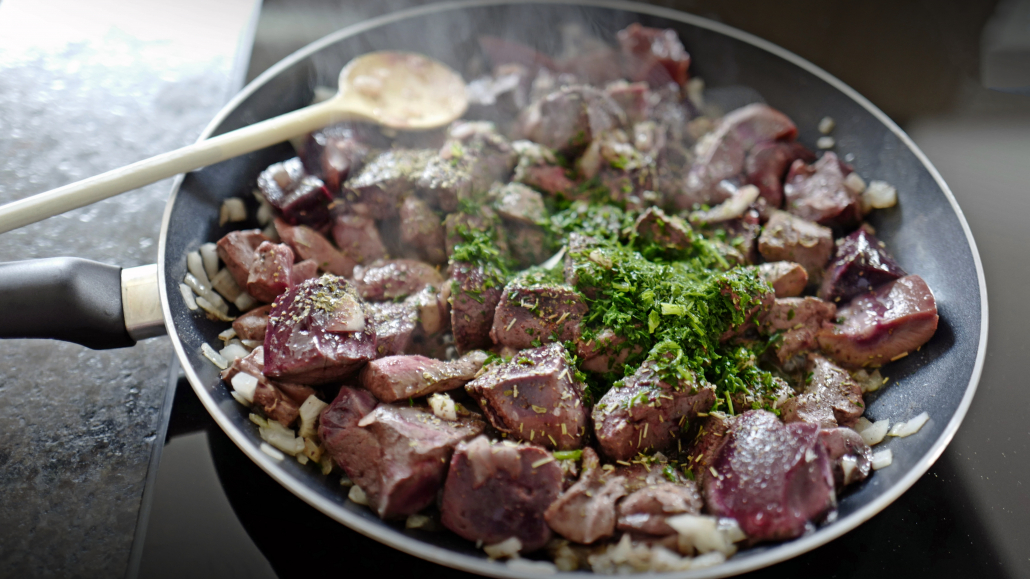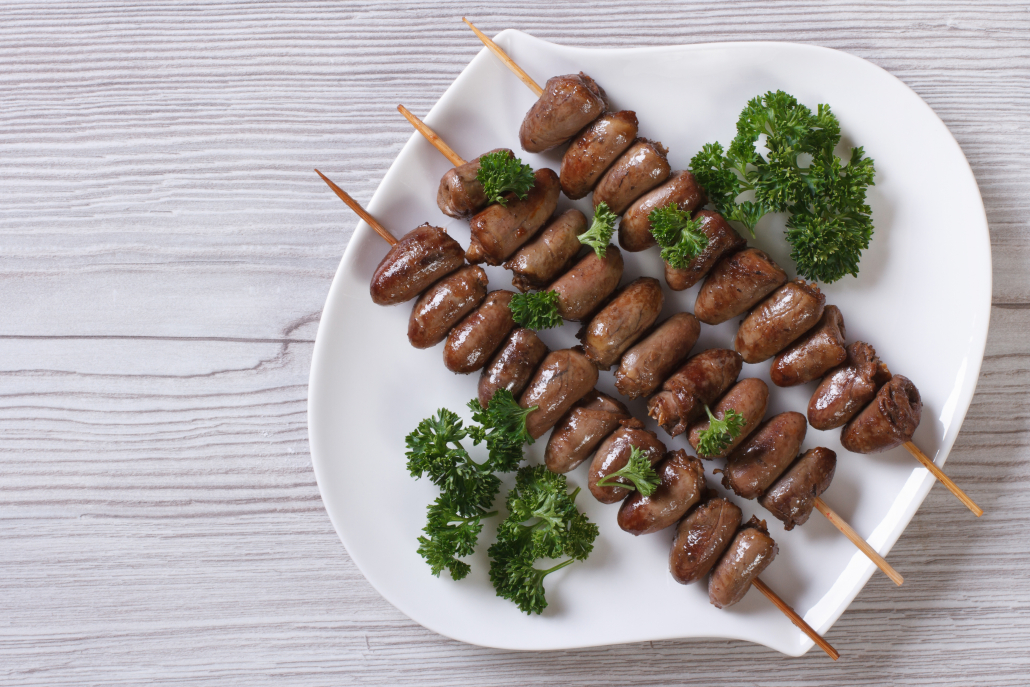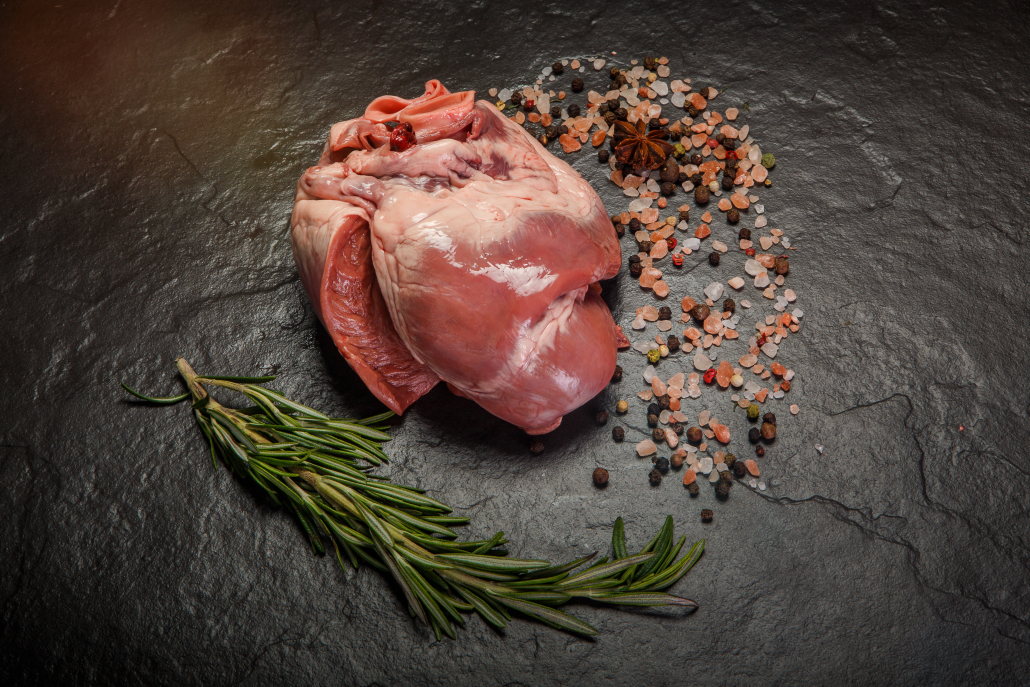We include products in articles we think are useful for our readers. If you buy products or services through links on our website, we may earn a small commission.
Pork Heart: Nutrition, Benefits, Recipe

Table of Contents
Pork is known and loved for providing all sorts of delicious products. What’s less well-known is that pork heart can also be a nutritious and tasty addition to your nose-to-tail diet!
Turns out that pork heart is making a science-backed comeback. New research has just begun to confirm the wide-ranging health benefits of the ancient practice of eating the whole animal — heart included.
In this article, we’ll take a closer look at pork heart’s nutritional content, health benefits, recipes, and more.
What is Pork Heart?
Pork heart, as you might presume, is simply the prepared heart of a pig. It’s completely edible and becomes truly tasty when cooked well.
Pork heart stands out from most other organ meat. It’s unique in the sense that it’s classified as both an organ meat and a muscle meat (yes, the heart is a muscle).
Most of the ancient tribes and cultures throughout the world ate heart. [1] In areas where cattle were most present, beef heart was common. While in areas where pigs were more common, pork heart was a staple.
Modern food science shows us why these organs were so instinctually popular.
Pork Heart Nutrition
Pork heart is high in essential B vitamins, zinc, iron, selenium, coenzyme Q10, and more. [2]
Let’s take a closer look at pork heart nutrition, beginning with its macronutrients content.
Pig Heart Macronutrients
| 1 pig heart | |
| Total calories | 266 |
| Total fat | 9.9 grams |
| Saturated fat | 2.6 grams |
| Trans fat | 0.0 grams |
| Cholesterol | 296.1 milligrams |
| Sodium | 126.6 milligrams |
| Carbohydrates | 3 grams |
| Net Carbs | 3 grams |
| Sugar | 0 grams |
| Protein | 39 grams |
Protein
Pork heart provides 29 grams of complete protein, which makes it a highly satiating food. [3]
Carbohydrates
Pork heart contains trace amounts of carbohydrates — 3 grams per heart, to be exact. This isn’t nearly enough to affect blood glucose levels or kick you out of ketosis. So it’s a perfect addition to a ketogenic and carnivore diet food list.
Fat
Pork heart is lower in fat than most varieties of conventional pork. The fat it does contain is mostly polyunsaturated.
Only 2.6 grams of its nearly 10 grams is saturated fat. PUFA’s, as they’re called, have both pros and cons. One concern is that they can be destabilized by heat and cause inflammation. The PUFA content of pastured pork heart is likely to be lower.
Pig Heart Micronutrients
| Nutrient | 1 pork heart | %RDV |
| Iron | 4.6 milligrams | 59% |
| Magnesium | 32.5 milligrams | 11% |
| Phosphorus | 377 milligrams | 38% |
| Zinc | 5.1 milligrams | 42% |
| Copper | 1 milligram | 46% |
| Thiamine | 1.5 milligrams | 92% |
| Riboflavin (B2) | 2.7 milligram | 158% |
| Niacin | 14.4 milligrams | 76% |
| Vitamin B6 | 0.5 milligrams | 44% |
| Vitamin B12 | 3.9 micrograms | 143% |
B12
Pork heart is a great source of B12. Just one heart contains 143% of your RDV. Most people find that a diet rich in heart and other B12 foods helps them stay energized throughout the day.
Studies confirm that B12 contributes to cellular energy production, mental health, and immune strength. [4][5]
B2 (Riboflavin)
Heart is also a great source of B2 (riboflavin), coming in at 158% RDV per single heart serving. Riboflavin contributes to cellular energy generation, eyesight health, and more. Like virtually every B vitamin, t’s also anti-fatigue. [6]
Iron
Pork heart is richer in iron than most other pork products. One heart contains over half your recommended daily value. This easily-absorbed heme iron plays a vital role in keeping the body oxygenated. [7]
Pork heart’s iron content may be especially helpful for pregnant or nursing women, who are more likely to suffer from subclinical iron deficiencies. [8]
Coenzyme Q10
The hearts of most species — including us humans — are loaded with coenzyme Q10. Pork heart is no exception.
This interesting antioxidant has been found to possess anti-stress, anti-aging, and anti-inflammatory properties. Dr. Kiltz recommends coenzyme Q10 supplements to women who want to promote their fertility the natural way. Pork heart offers another potential whole-food solution. [9]
Zinc
One pork heart offers 42% of your daily zinc needs. Zinc is an essential nutrient, meaning our bodies can’t make it on their own, so we have to get it from our food. And it plays a critical role in metabolizing nutrients, maintaining an effective immune system, and growing and repairing body tissues–including your own heart.2
Rare peptides
Pork heart is likely to contain unique peptides, which may include the DWORF peptide. DWORF (or dwarf open reading frame peptide) may improve the contractile strength of — you guessed it — your own heart. [10]
Pork Heart Health Benefits
As you can see from the above nutritional info, pork heart’s nutrition profiles fall right into line with what’s called the “like-supports-like” concept.
This concept refers to the way that consuming an animal organ may benefit the very same organ, in you. According to this concept, eating animal liver supports your liver, eating animal brain supports your brain, and consuming animal heart supports your heart, et cetera.
Many of pork heart’s most central benefits revolve around heart health, so we’ll review this benefit first. Here’s a closer look:
Improved Heart Health
Pork heart’s combination of B vitamins, iron, and coenzyme Q10, and zinc, means it’s great for your heart.
Research has shown that B vitamins may have a cardioprotective effect and reduce your risk of heart disease. [11] Other studies have found that B vitamins are associated with healthy blood pressure levels, which means great things for heart health in the long-term. [12]
Iron, is the second nutrient likely responsible for pork heart’s heart-health benefits. Iron delivers oxygen into your muscle tissues, including the heart muscle. [13]
The zinc in pork heart may affect the heart by mediating oxidative stress in the heart, and maintaining myocardial structure.15
More energy
Those of you who’ve ever taken a B12 or desiccated liver supplement will know just how energizing it feels.
Pork heart’s B vitamin content may be more than enough to energize your body, improve your lean muscle mass, and increase your athletic performance.
That’s because B vitamins are catalysts in the chemical reactions that turn food molecules into a usable energy source called ATP. [15][16]
Improved Mood
B vitamins have long been known to brighten one’s outlook on life. That’s because they help streamline the brain’s metabolic processes, while at the same time, clearing harmful metabolic byproducts like homocysteine out of your brain.
Lower homocysteine levels have been correlated with happiness, while higher levels are associated with anxiety and stress.
Nourish your own heart with the hearts of pigs and other animals, and you might even start to feel more love and compassion yourself.
Does this sound like woo? Research says it may not be. The heart is known to generate a subtle electric field around itself — a field that’s bigger than the person generating it — which may shape how one perceives and interacts with the outside world. If your heart is healthy, it may also emit a healthier field, making life just that little bit brighter. [19]
Improved Immunity
Immune health is another area where pork heart’s benefits shine. It’s rich in zinc and other known immune-promoting nutrients.
Zinc has such strong antiviral properties that it can prevent viruses from binding to host cells — effectively stopping viral replication in its tracks. Zinc may also strengthen your lung’s natural barriers enough to stop invading viruses. [20]
Sourcing Quality Pork Heart
Quality is everything when it comes to pork heart. The heart of a stressed pig will be far less nutritious than that of a happy, healthy, unstressed one.
Stress itself may be transferable from animal to eater. Research in ringworms shows that the emotion/information present in polyamine proteins can be transferred through ingestion from one creature to the next. [21]
Quality is important for another reason, too: fatty acid content. Unlike ruminant animals, pigs aren’t able to convert the unhealthy additives they’re eating into a healthy ‘finished product.’
If a pig is fed a toxin-laden, high-PUFA diet, then those toxins and PUFA’s will wind up in their muscle meat, organs, and heart, and eventually in you![22]
How to Cook Pig Heart
Cooking pig heart can be quite simple. It’s a somewhat lean meat that does best when cooked like other lean meats. Eaters also say it has a rich, delightful flavor that’s more comparable to beef than pork.
Only the texture is unusual — while the last ribeye you enjoyed probably had a grit and grain to it, pork heart’s texture is pretty smooth.
Here are two keto-friendly recipes that make enjoying pork heart easy.
Pig Heart Recipe: Pan-fried Heart and Herbs

If you’ve been waiting for an opportunity to put your herb garden’s yield to good use, wait no longer. This is also a great recipe for those of you on a mediterranean keto diet.
Ingredients
- 4 tablespoons ghee, tallow, or olive oil
- 2 cloves of garlic (minced)
- 1 sprig thyme (chopped)
- 1 sprig parsley (chopped)
- 1 teaspoon garlic powder
- Salt and pepper to taste
Process
- Rinse heart, then chop it up into bite-sized cubes.
- Place heart and all other ingredients into a stainless steel container. Mix well, then cover and set in the fridge overnight.
- The next day, heat a cast iron pan over medium heat.
- Pour all ingredients into the pan and cook for 8-10 minutes, stirring as you cook.
- Once the heart turns golden brown, cut each chunk in half.
- Continue stirring the pan’s contents until the herbs are nice and crispy.
Pork Heart: The Takeaway
If you haven’t tried pork heart yet, now’s a great time to give it a try. Need more convincing? Here’s a review of its impressive nutritional content:
- Rich in zinc heme iron, and trace nutrients
- Rich in heart-specific nutrients like COQ10
- Very in B vitamins, especially B6 and B12
All these nutrients combine to provide some seriously powerful health benefits. Pork heart may be:
- energizing
- supportive of heart health
- supportive of positive mood
- supportive of the immune system















